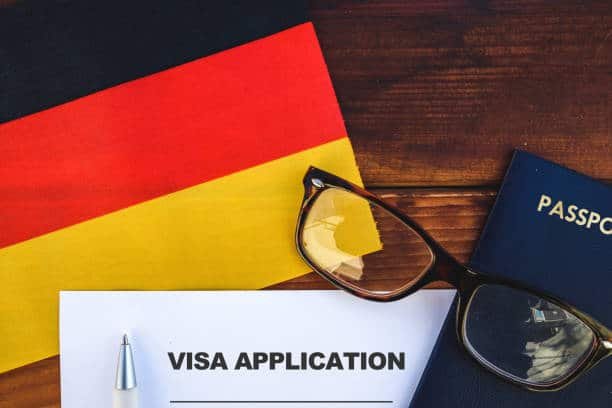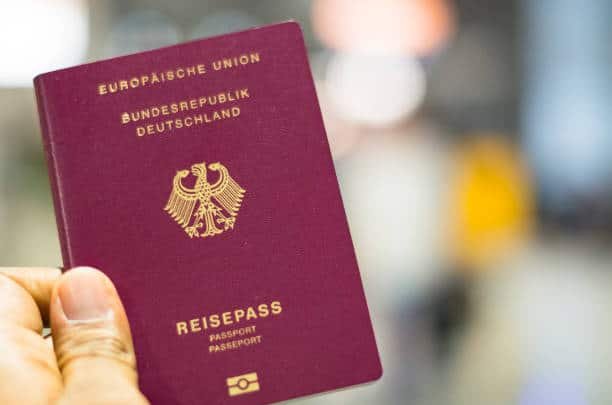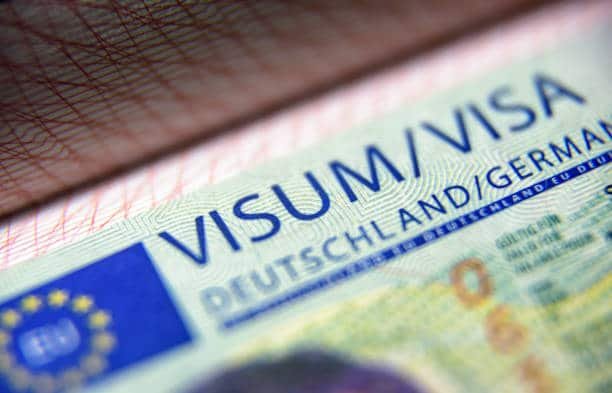Best Guide On Work Visa in Germany In 2023

Are you interested in a Work Visa in Germany? Various work visas are available for foreign people seeking to work in Germany. The kind of visa needed will depend on the person’s nationality, qualifications, and the length and purpose of the stay.
The “Employment Visa” is the most popular type of work visa for overseas nationals. This kind of visa is frequently given to those who have a job offer from a German company and intend to stay in the nation for over 90 days. Candidates must produce documentation of their credentials, including proof of their education and professional experience, and show that they have the knowledge and expertise required to carry out the job that has been provided to be approved for an employment visa.
Other work visas include the “Jobseeker Visa,” which permits people to enter Germany and work as self-employed professionals for up to six months, and the “Freelance Visa,” given to people who want to work as independent contractors in Germany.
Foreign nationals arriving in Germany may also need to apply for a residence permit, register with the local authorities, and get a work visa. It is significant to note that the procedure for acquiring a work visa can be difficult and drawn out. It is advised that persons speak with an experienced immigration lawyer or visa specialist to comply with all rules and provide all required paperwork.
SEE ALSO: Trucking Jobs in Canada: All You Need to Know in 2023

How do I get a work visa in Germany?
You must adhere to the following general procedures to obtain a work visa in Germany:
- Verify your qualification: Verify that you fit the criteria for the work visa you request. This can entail having a work offer from a German firm, fitting certain criteria, and possessing sufficient funds.
- Find employment: If you have not received a work offer, seek openings in Germany. To assist you in finding a position that suits you, you might use internet job boards or work with a recruitment firm.
- Obtain a job offer: After you have obtained employment, your company must give you a job offer that includes information about your position, compensation, and working hours.
- Gather required documents: All necessary documentation must be gathered before applying for a work visa, including your passport, a job offer, transcripts of your academic and professional achievements, and evidence of health insurance.
- Submit your application: You can go in person to the German embassy or consulate in your home country to submit your work visa application, or you can do it online. Give yourself enough time because the application process could take weeks or months.
- Attend the interview: Attending the interview may be a requirement of the application procedure, depending on your nationality and the visa type you seek.
- Get your visa: If your application is accepted, you will get your work visa, allowing you to go to Germany and begin employment.
It is crucial to remember that the procedure for acquiring a work visa in Germany can be challenging and may change based on your unique situation. To make sure you comply with all criteria and submit the required papers, it is advised that you speak with a knowledgeable immigration lawyer or visa specialist.
How long is a work visa in Germany?
The type of visa you are issued, and your unique situation will determine how long your work visa will be valid in Germany.
Foreign nationals can often work in Germany for up to 90 days with an employment visa. Once you’ve arrived in Germany, you must apply for a residence permit if you intend to work there for more than 90 days.
The length of a residence permit varies depending on its type, job agreement, and qualifications. For instance, a temporary residence permit for vocational training is provided for up to two years. In contrast, a Blue Card permit for highly qualified workers is initially issued for up to four years.
It is crucial to remember that work visas and residence permits in Germany must be extended or renewed before they expire. After a set amount of time, you can be qualified to apply for citizenship or permanent residency if you want to stay in Germany permanently.
Which visa allows you to work in Germany?
The “Employment Visa” (sometimes called a “D Visa”) is the document that enables you to work in Germany. Foreign nationals who have a job offer from a German employer and intend to stay in the nation for longer than 90 days are granted this form of visa.
You must present documentation of your credentials, such as transcripts and work history, to apply for an employment visa. You must also show that you have the knowledge and practical expertise required to carry out the position given to you. Additionally, your company must submit a job offer with information about your position, compensation, and working conditions.
It is crucial to remember that getting an employment visa in Germany is simply the first stage in a lengthy procedure. You must apply for a residence visa to work and live in Germany for the duration of your employment once you have arrived in the nation.

How much is a work visa in Germany?
The price of a work visa in Germany varies depending on your country, the type of visa you are applying for, and the length of the application procedure. An Employment Visa, which permits you to work in Germany for up to 90 days, will cost €75 as of 2021. Depending on the type of permit, the cost for a long-term visa or residence permit that enables you to work in Germany for longer than 90 days ranges from €100 to €110.
You might also need to pay for other services, including collecting biometric data, translating documents, courier fees, and visa fees. Depending on your unique situation, these additional expenses may change.
It is significant to note that other fees, such as transport, lodging, and living expenses in Germany, are not included in the visa cost. Additionally, you should be aware that living expenses in Germany, particularly in major cities like Berlin, Munich, and Frankfurt, may be quite costly.
Is it hard to get a job in Germany?
Particularly in some professions and industries, the employment market in Germany can be fiercely competitive. However, there are many opportunities for foreign employees with the required credentials and expertise because Germany has a high demand for qualified workers in industries including engineering, IT, healthcare, and skilled crafts.
Finding a job in Germany may be more difficult if you are a non-EU citizen because you must fulfil certain criteria to qualify for a work visa. For instance, you will normally require a job offer from a German business and documentation of your credentials and employment history.
It is also crucial to remember that being able to speak German might be advantageous when looking for employment in Germany, as many companies prefer to hire people who can do so. However, there are also a lot of multinational corporations in Germany where English is the dominant business language.
Overall, qualified professionals may locate career possibilities in Germany, even though it may require time and effort.
How much bank balance is required for a German work visa?
It is also crucial to remember that being able to speak German might be advantageous when looking for employment in Germany, as many companies prefer to hire people who can do so. However, there are also a lot of multinational corporations in Germany where English is the dominant business language.
Overall, qualified professionals may locate career possibilities in Germany, even though it may require time and effort.
However, some visas may have higher financial requirements. For instance, the EU Blue Card needs a minimum annual salary of €55,200 or evidence that you have enough money to pay your living expenses.
The precise amount of dollars needed will depend on your unique situation, so it’s vital to remember that it’s always a good idea to check with the German embassy or consulate in your native country for the latest information.
What Is The Eligibility To Work In Germany?
Your nationality, educational background, and work experience are the only criteria determining whether you are qualified to work in Germany.
You have the right to work in Germany without a work visa or permission if you are a citizen of one of the following nations: Switzerland, the European Union (EU), or the European Economic Area (EEA). You might still have to register with the government and adhere to certain conditions, such as having health insurance and a current residency permit.
To work in Germany as a non-EU citizen, you will normally need to apply for a work visa or permission. Different work visa requirements may apply depending on the work you’ll be doing, your credentials, and your employer.
In general, non-EU citizens must meet the following requirements to work in Germany:
- Having a legitimate employment offer from a German employer
- Show that you have the skills and expertise needed for the role and that there are no eligible applicants for the position in Germany or the EU.
- Visit your country’s German embassy or consulate to request a work permit or visa.
- Additionally, if your profession includes interacting with the public or calls for knowledge of German, you might need to achieve certain language competency criteria.
Does Germany Sponsor Work Visa?
Yes, Germany sponsors work permits for specific professions and under specific circumstances.
If you are a non-EU national and a German employer has offered you a job, the employer may sponsor your application for a work visa or permit. However, your company must first show that you are qualified for the work and have the necessary experience and that there are no acceptable candidates for the post in Germany or the EU.
The EU Blue Card program is one of many visa options that permit non-EU nationals to live and work in Germany. Highly competent non-EU citizens can work in Germany, and other EU member states with the EU Blue Card and a work and residency permit.
You must have a job offer in Germany that earns a minimum annual income of €55,200 (or €43,056 for some professions in need of workers), hold a recognised university degree or a comparable qualification, and meet a few other requirements to be eligible for an EU Blue Card.
It’s crucial to remember that the requirements and qualifying criteria for work visas and permits can change based on your unique situation and the type of visa you are requesting. Contact the German embassy or consulate in your residence for the most up-to-date details and regulations.
FAQs for Work Visa in Germany
The following are some commonly asked questions (FAQs) regarding German work visas:
Does working in Germany require a work visa?
You are exempt from needing a work visa if you are a citizen of an EU/EEA nation or Switzerland. To work in Germany, non-EU nationals normally need a work visa or permit.
What conditions must be met to obtain a work visa in Germany?
The requirements change depending on your nationality, your credentials, and the type of work visa you seek. In general, you need to show that there are no qualified candidates for the position in Germany or the EU, have a legitimate employment offer from a German business, and meet the educational and professional requirements of the role.
How can I apply for a German work visa?
At the German embassy or consulate in your native country, you can apply for a work visa or permission. You must produce several papers, such as your passport, a job offer, and credentials verification.
How long does it take in Germany to obtain a work visa?
Depending on your unique situation and the workload of the embassy or consulate, the processing time may change. To give ample processing time, applying well before your anticipated travel dates is always a good idea.
Is German a requirement for employment in Germany?
Depending on the kind of work you do. While some vocations demand a rudimentary understanding of the language, others may call for proficiency. In general, speaking German can help you in your daily life in Germany and the job market.
Can I enter Germany with my family on a work visa?
You can bring your family along on a work visa or permit. Nevertheless, you must fulfil certain conditions and offer proof that you can support your family members while you are in Germany.
What is a type d German visa?
With a type D German visa, you can enter the country and remain there for more than 90 days. It is also referred to as a long-stay visa or a national visa. Type D visas can be obtained for work, study, family reunions, and language training, among other things.
The type D visa is normally granted for up to 90 days, after which you must apply for a residence permit to stay in Germany for an extended time. The local immigration office (Ausländerbehörde) in Germany issues the residency permit.
You must apply to your home country’s German embassy or consulate for a type D German visa. Depending on why you’re visiting Germany, there may be differences in the application requirements and procedure.
Suppose you want to apply for a work visa, for instance. In that case, you usually need a legitimate job offer from a German business, the necessary skills and experience, and proof that there are no qualified candidates for the position in Germany or the EU.
It’s crucial to remember that the requirements and procedures for obtaining a type D visa can change based on your unique situation and the type of visa you seek. Contact the German embassy or consulate in your residence for the most up-to-date details and regulations.
READ ALSO: Agriculture Jobs in Canada: Opportunities and Requirements in 2023
Conclusion on Work Visa in Germany
And last, if you are a non-EU citizen and want to work in Germany, you usually need a work visa or permit. Different requirements and qualifications can be necessary depending on your circumstances and the kind of visa you’re applying for.
To be approved for a work visa in Germany, you normally need a genuine employment offer from a German company, the required qualifications in terms of skills and experience, and evidence that there are no suitable local or EU candidates for the position.
It’s also important to remember that, depending on your line of work, knowing German may or may not be necessary for navigating daily life in Germany and conducting a job search.
Think about working in Germany in general. In that case, it is crucial to understand the precise requirements and processes for acquiring a work visa or permit. Your country’s German embassy or consulate can also provide you with the latest updated details and requirements.
Source
- https://visasubmission.com/en/page/work-permit
- https://www.workfromhomestories.com/visa/germany/
- https://www.studying-in-germany.org/german-student-visa/
- https://workstudyvisa.com/
- https://www.uni-koblenz.de/en/international-relations-office/incomings/bachelor-master-students/visa-and-entry-requirements
- https://www.cic.gc.ca/english/helpcentre/answer.asp?qnum=1482&top=15
- https://blog.lingoda.com/en/work-in-germany-without-speaking-german/





